How Did Earth Get Its Name - Who Named the Earth?
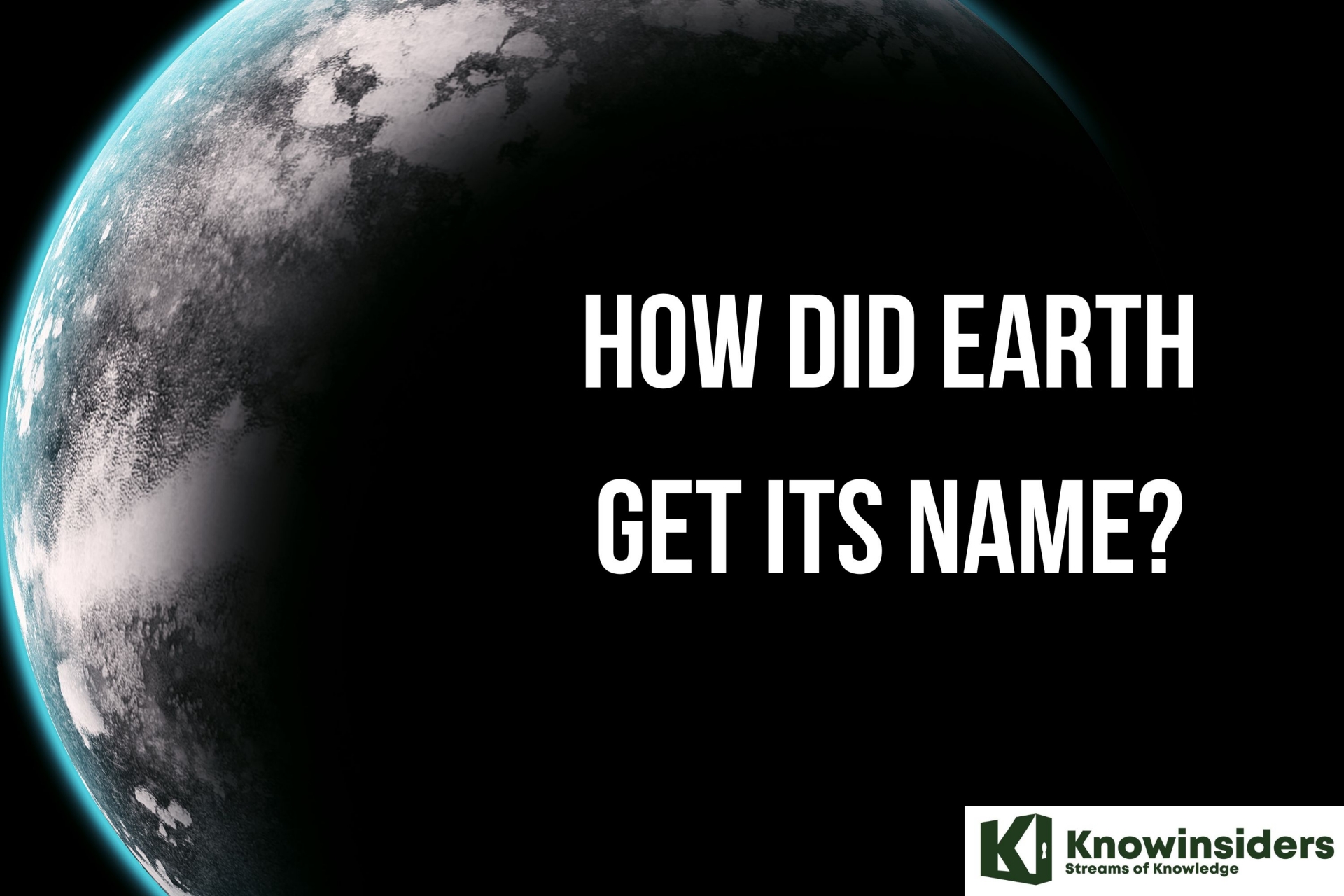 |
| How Did Earth Get Its Name? |
| Table of Content |
Planet Earth is a wonderful place with a rich, complex history. This can lead to many gaps in knowledge that will fade over time, including many different names for our planet in the past. Although we don't know exactly who first coined the name "Earth" and attributed it to our planet, historians have been able to use linguistics to study the origins of the planet. this term, according to Live Science.
According to the World Atlas, the modern spelling of the word Earth is estimated to be at least 1,000 years old. But this is not the original way of writing. "Earth" is in fact a word of Indo-European origin.
In German, the word became the word "Ertho", and in Old English the word "Eorthe". According to Science Focus, along with the evolution of language, these words later became "Erde" and "Earth" in modern German and English. Other terms used to describe our planet have evolved in the same way - linguists find much evidence of Old Saxon references to Earth with "Ertha", or " Erthe" in Old Frisian, "Eretz" (ארץ) in Hebrew... are also recorded in ancient texts.
Planet Earth
In addition to being the birthplace of humanity and the cradle of human civilization, Earth is the only known planet in our Solar System that is capable of sustaining life. As a terrestrial planet, Earth is located within the Inner Solar System between Venus and Mars (which are also terrestrial planets). This place Earth in a prime location with regards to our Sun’s Habitable Zone.
Earth has a number of nicknames, including the Blue Planet, Gaia, Terra, and “the world” – which reflects its centrality to the creation stories of every single human culture that has ever existed. But the most remarkable thing about our planet is its diversity. Not only are there an endless array of plants, animals, avians, insects, and mammals, but they exist in every terrestrial environment. So how exactly did Earth come to be the fertile, life-giving place we all know and love?
Size, Mass, and Orbit
With a mean radius of 6371 km and a mass of 5.97×1024 kg, Earth is the fifth largest and fifth most-massive planet in the Solar System. In essence, it is the largest terrestrial planet, but is smaller and less massive than any of the gas/ice giants of the Outer Solar System. And with a mean density of 5.514 g/cm³, it is the densest planet in the Solar System.
In terms of its orbit, Earth has a very minor eccentricity (approx. 0.0167) and ranges in its distance from the Sun from 147,095,000 km (0.983 AU) at perihelion to 151,930,000 km (1.015 AU) at aphelion. This works out to an average distance (aka. semi-major axis) of 149,598,261 km, which is the basis of a single Astronomical Unit (AU).
The Earth has an orbital period of 365.25 days, which is the equivalent of 1.000017 Julian years. This means that every four years (in what is known as a Leap Year), the Earth calendar must include an extra day. Though technically a full day is considered to be 24 hours long, our planet takes precisely 23h 56m and 4 s to complete a single sidereal rotation (0.997 Earth days).
Viewed from the celestial north pole, the motion of Earth and its axial rotation appear counterclockwise. From the vantage point above the north poles of both the Sun and Earth, Earth orbits the Sun in a counterclockwise direction.
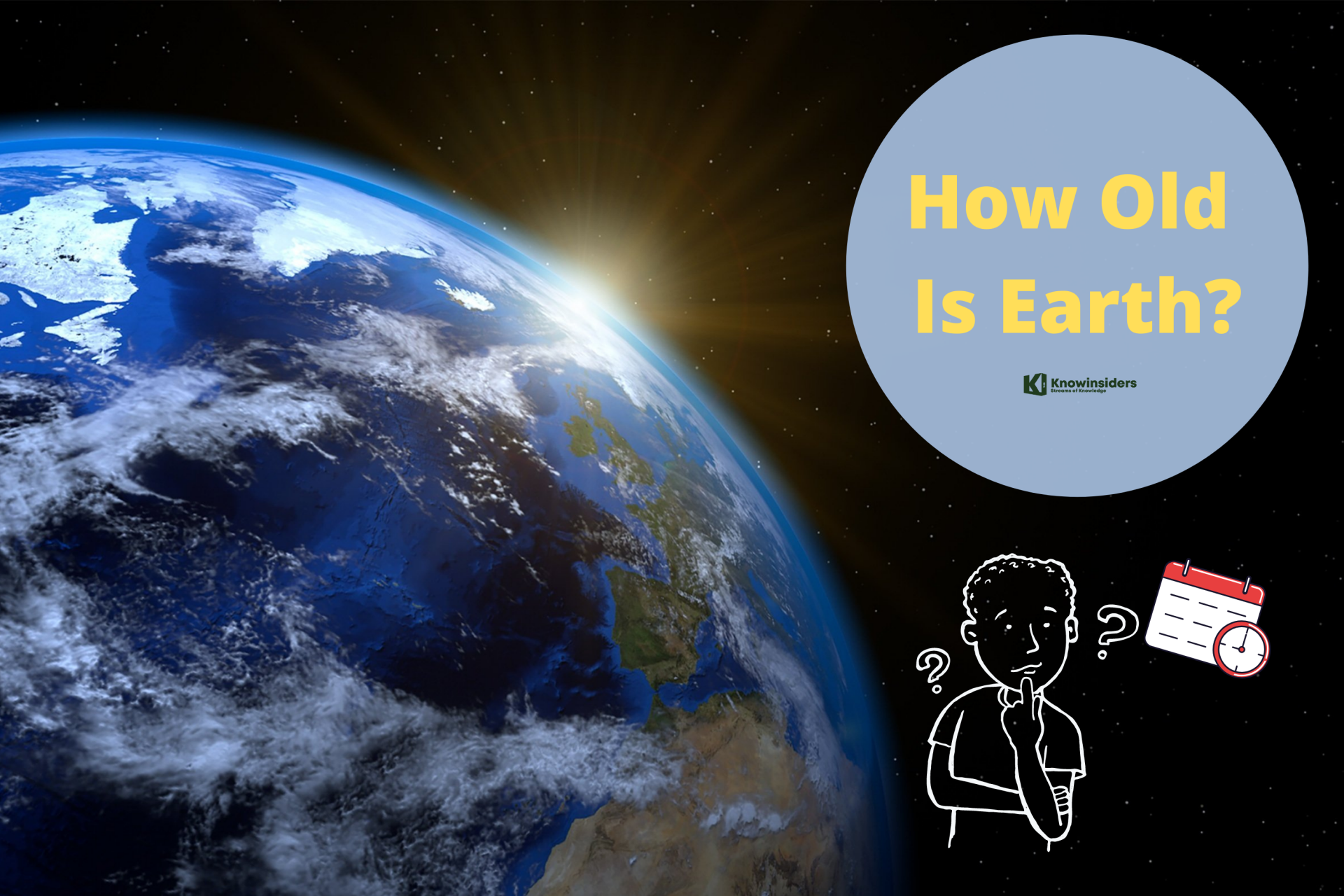 How Old Is The Earth In Science, Bible How Old Is The Earth In Science, Bible Although the universe is thought to be about 13.77 billion years old, planet Earth is much younger than that. Scroll down to know how old ... |
Who Named Earth?
Jupiter was the mighty chief of the gods in ancient Rome's pre-Christian religion. It was also said that Rome's legendary founders, Romulus and Remus, were the children of the warlike god Mars, himself Jupiter's son.
Astronomy has always been popular with those who study the capital "C" Classics. Seven out of the eight planets in our solar system were named after Greek or Roman deities. You're living on the only exception to that rule.
All of the planets, except for Earth, were named after Greek and Roman gods and goddesses. The name Earth is an English/German name that simply means the ground. It comes from the Old English words 'eor(th)e' and 'ertha'. In German, it is 'erde'. The name Earth is at least 1000 years old.
The Greeks and Romans named most of the planets in the Solar System after particular gods, and we have kept those names in English. Uranus, Neptune, and Pluto, all unknown in classical times, were named by the modern astronomers who discovered them, but still after Greek and Roman gods.
Nevertheless, linguists have been able to go back and reconstruct this mystery word. Spelled "ertho" in scholarly texts, it's always preceded by an asterisk. This asterisk acknowledges the lack of written confirmation that the word was really used.
Nobody knows when people started using words like "Earth" or "Erde" to refer to the planet as a whole and not just the ground they walked on.
Back in 1783, German astronomer Johann Elert Bode named the seventh planet from our sun "Uranus" (after a Greek god). And though Pluto is no longer considered a planet, we know that 11-year-old Venetia Burney named it in 1930.
But if a single person gave planet Earth its English name — which is unlikely to say the least — his or her identity has been lost to the sands of time.
Still, it's clear that while Mercury, Venus, Mars, Jupiter, Saturn, Uranus and Neptune all started out as the proper names of ancient gods, "Earth" did not. That's why our planet is sometimes called "the earth" with a lowercase "e."
However, according to the University of Oxford Style Guide, the word "Earth" should be capitalized when one is "referring to the name of the planet but not when referring to the ground/soil etc."
Facts About Earth
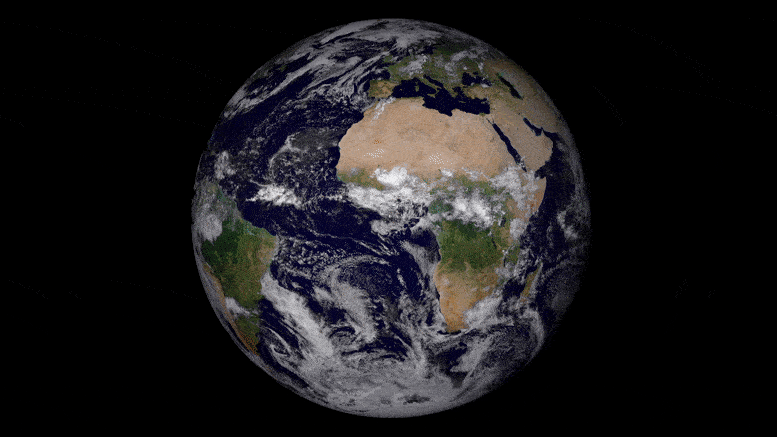 |
| Photo: scitechdaily |
♦ Translations of the Bible into English was one of the earliest recorded use of the name Earth – ” God called the dry land Earth, and the waters that were gathered together he called Seas. And God saw that it was good. “(Genesis 1:10)
♦ Earth is the only planet in the Solar System with plate tectonics. The outer crust of the Earth is broken up into regions known as tectonic plates. These are floating on top of the magma interior of the Earth and can move against one another. When two plates collide, one plate can go underneath another.
♦ Earth doesn’t take 24 hours to rotate on its axis. It takes 23 hours, 56 minutes and 4 seconds to completely rotate around its axis; If you add up that little motion from the Sun that we see because the Earth is orbiting around it, as well as the rotation on its axis, you get a total of 24 hours.
♦ Everyone knows that the Earth has 1 Moon. But did you know there are 2 additional asteroids locked into a co-orbital orbits with Earth? They’re called 3753 Cruithne and 2002 AA29. The first doesn’t actually orbit the Earth, but has a synchronized orbit with our planet, that makes it look like it’s following the Earth in orbit, but it’s actually following its own, distinct path around the Sun. The 2002 AA29 travels in a horseshoe orbit around the Earth that brings it close to the planet every 95 years.
♦ Earth is gradually slowing down. Every few years, an extra second is added to make up for lost time. In other words, millions of years ago, a day on Earth would have been only 20 hours long. It is believed that, in another million years time, a day on Earth will be 27 hours long.
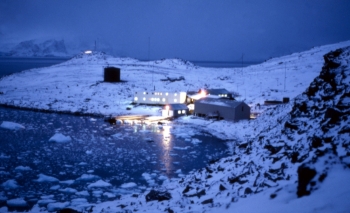 Top 7 Loneliest Places on the Planet Top 7 Loneliest Places on the Planet There are times when you want to leave everything behind and looking to take a break from the ongoing societal craps in your life, you ... |
40+ Names For Earth From Around The World
In European Languages
1. Aarde, this name for Earth comes from the Dutch language which is the official language of Netherlands. This can also be one of the best nature-related baby names.
2. Art, the word comes from the Maltese language and means “Earth”. This language is spoken in the country of Malta.
3. Eorþe, this is the word for Earth in Old English. From Old English, the word mutated and became ‘Erthe’ in Middle English.
4. Erde, this is the German name for Earth. Its origin can be traced to Old High German, in which the word used for Earth was ‘erda’. Can be a nature-related name. This is a really sweet earth synonym.
5. Gaea, in Greek mythology, Gaea was the Goddess of Earth. She was the daughter of chaos and also the mother and wife of both Uranus and Pontus.
6. Jord, this is a Norwegian word that is a synonym of earth. It is closely associated with the Danish word ‘Jorden’ as is evident.
7. Jorden, this name for Earth comes from the Danish language of Denmark. The word has Old English origins.
8. Maa, this short word for Earth comes from the Estonian language spoken in Estonia. Coincidentally, the word ‘Maa’ means “mother” in Hindi, a language spoken in the Indian subcontinent. And we often refer to earth as ‘Mother Earth’. It’s an apt synonym.
9. Terra, this name comes from the now-dead language of Latin. In ancient Roman mythology, Terra was the goddess of Earth. Originally, her name was ‘Tellus’.
10. Terre, this is the French word for Earth. The origin of this word can be traced back to Old French and from there, to the Latin word ‘Terre’. The French word also means “land”, “soil”, and “property”.
11. Tierra, this beautiful name meaning Mother Earth comes from the equally beautiful Latin language. The word is derived from the Latin word for Earth ‘Terra’.
12. Země, this beautiful word for Earth comes from Czech language. It is spoken in Czech Republic and is also the official language of the same.
13. Zemlja, this is the Bosnian name meaning Earth. Bosnian is a language spoken in Bosnia and Herzegovina.
14. Zemyata, this word for Earth in Bulgarian is a bit tricky to pronounce. The name can also be spelled as ‘Zamiata’ in English.
In Asian Languages
15. Aephndin olk, this long word for earth comes from the language, Lao.
16. Bhumi, this word for earth is used in the Malayalam language of India.
17. Chikyu, this cute little word for earth comes from Japanese, the official language of Japan.
18. Dedamits’a, this word for earth comes from the Georgian language.
19. Dharti, this is the Hindi word for Earth.
20. Diqiu, this is the Chinese word for earth. Other words which denote earth in the Chinese language include ‘De’, ‘Tu’, ‘Nitu’, ‘Peitu’, ‘Qiu’, and ‘Chen’.
21. Jigu, with Korean culture taking over the universe by storm, one should know the Korean term for earth. Jigu not only means “earth” but also “plateau” in Korean.
22. Kambharmyay, this is the Burmese word for earth. Burmese is a language spoken in Mayanmar or as it was previously known, Burma.
23. Lok, this is the Thai word for Earth. Thai is the official language of Thailand.
24. Prithbi, the word is eerily close to the Hindi word ‘Prithvi’. Both mean “earth” and are part of two languages spoken in the same country, India.
25. Prithvi, this word for earth comes from the language of Hindi which is spoken in the northern parts of the Indian subcontinent. It is a dominant language in India, a country which is home to around 19,500 languages. This name is an aesthetic synonym for earth.
26. Pumi, this word for earth comes from the Tamil language. This language too is spoken by people in the southern part of India.
27. Toprak, Toprak is the Turkish word for planet earth. The language is spoken in the country of Turkey.
28. Trái đất, this is the Vietnamese word for earth. Vietnamese is the official language of Vietnam, a country located in South-East Asia.
29. Yer, this word for planet earth comes from the language Azerbaijani. The name has its origins in Old Turkic. The language of Azerbaijani is spoken in the newly-formed country of Azerbaijan.
30. Ýer, this is the Turkmen word for earth. The word closely resembles the Azerbaijani word ‘Yer’ for earth.
31. Yerkir, this word for earth can be found in any Armenian dictionary. The origin of this word can be traced to Old Armenian word ‘Erkir’.
32. Yerküre, in the Turkish language Earth is called Yerküre. The people there also refer to Earth as Acun or Yeryüzü.
In African Languages
33. Aarde, this name of the earth comes from the language Afrikaans. It is the same as the Dutch word ‘Aarde’ which also means earth. This is one of the cool earth names.
34. Dhulka, this name for earth comes from the Somali language of Somalia. Somalia is a country infamous for its pirates who terrorize the surrounding seas. If you’re writing a creative work, this is a good synonym for earth.
35. Duniya, in Swahili language, one refers to the earth as ‘dunia’. This Bantu language is also known as ‘Kiswahili’ and is spoken by the Swahili people of Tanzania, Kenya and Uganda. The term ‘Dunia’ is also found in the Hindi language, where it means “the universe”.
36. Lapansi, one of the earth names that comes from the Chichewa language. Chichewa is a language spoken in Southern and East Africa.
37. Umhlaba, the name of the earth from the Zulu language. Zulu language is spoken in Southern Africa. It’s a good synonym for earth.
38. Uwa, this name for earth comes from the Igbo language. This is one of the best names of Earth.
In Middle-Eastern Languages
39. Adamah, this is a Hebrew origin name which translates into “Earth”. One can easily see the word’s close relations with the commonly found English name ‘Adam’. Human beings have been described in various cultures as “dust of the earth” and the first man to have ever been created by God was Adam. Thus, one can clearly see the link in meanings of the two words.
40. ‘Ard, this is the Arabic word for earth. The word has its origins in Proto-Semitic. Arabic is a language spoken in Saudi Arabia.
41. Zamin, this word for earth comes from the Persian language. Remember Prince of Persia? The origin of the word can be traced to the Middle Persian word ‘Zmyk’. The language is spoken in Afghanistan, Iran and Tajikstan.
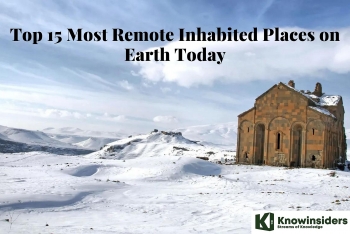 Top 15 Most Remote Inhabited Places on Earth Today Top 15 Most Remote Inhabited Places on Earth Today Whether by nature or by human contamination, these 15 locations on this planet are unsuitable for living or even deadly for humans to inhabit. |
 How And Where Was The First Man On Earth Born? How And Where Was The First Man On Earth Born? Scientists now know through fossil research that humans and apes have some kind of kinship and a common ancestor and that humans came about through ... |
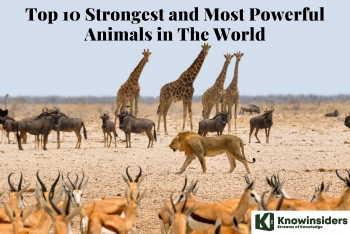 10 Strongest and Most Powerful Animals in The World 10 Strongest and Most Powerful Animals in The World The animal world has always been a topic of interest to everyone. If the ratio of strength to body mass is considered, many small animals ... |


























